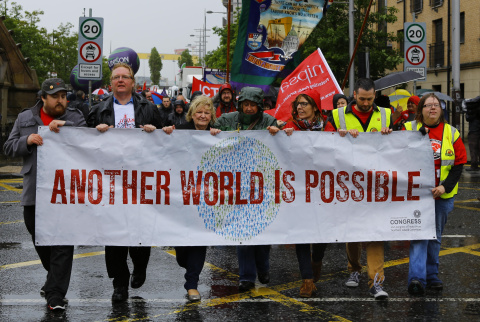
Stephen McCloskey
Five days before Christmas, members of the Royal College of Nursing (RCN) were on strike for the first time in one hundred years. They were forced into industrial action to secure a living wage commensurate with inflation and decent working conditions just two years after they were applauded by a grateful public from their doorsteps during the pandemic. A highly trained and invaluable workforce, nurses were among the frontline public workers who put their lives on the line to protect the rest of us from COVID-19. Now, they are among the in-work poor that include retail staff, classroom assistants and factory workers found by the Trussell Trust to make recourse to their foodbanks for emergency food parcels. With one-in-five or 14.5 million people living in poverty in the UK and struggling to meet essential needs, particularly food and energy bills, inequality for many has become a permanent condition.
If we scroll back further, we see that inequality is a global problem with the 2022 World Inequality Report finding that the richest 10 per cent of the global population controlled 52 per cent of global income, whereas the poorest half of the population earned 8.5 per cent of it. This contrast is even more pronounced when it comes to wealth with the richest 10 per cent owning 76 per cent of all wealth compared to just two per cent for the poorest half of the global population. Oxfam corroborated this evidence of deepening inequality when it calculated that the combination of COVID-19 and food prices, compounding existing levels of inequality, would push an additional 263 million people below the ridiculously low poverty line of $1.90 a day in 2022 bringing the global total to 860 million.
Inequality is not inevitable
But inequality is not inevitable; its a political choice often driven by ideology rather than economic necessity. Indeed, that champion of neoliberal economics, the IMF, roundly criticised the UK on its austerity response to the 2008 financial crisis suggesting that it ‘increased inequality’. Now an article by economic anthropologists Jason Hickel and Dylan Sullivan, argues that the global implementation of neoliberal policies between 1990 and 2019, particularly through the IMF and World Bank structural adjustment programs (SAPs), resulted in 16 million excess deaths from malnutrition. So, how did the authors arrive at this shocking statistic? Well, their analysis is based on Cuba’s mortality rates from malnutrition, which are comparable to high income countries, as it provides ‘universal access to basic nutritional requirements’ through food subsidies. By comparing Cuba’s death rate from malnutrition to countries that have either dismantled or were prevented by SAPs from implementing food provision programmes, the authors calculated the total of needless deaths from hunger. Some of these country comparisons are truly alarming with Hickel and Sullivan finding that India would have suffered 3.65 million fewer deaths from malnutrition had a universally available nutritional baseline been introduced.
Global hunger is, therefore, less a question of resources than political will; Cuba has been subjected to six decades of a brutal United States’ blockade which has resulted in cumulative economic damage to the Cuban economy costed at $154.22 billion in current prices. Nonetheless, Cuba has achieved stunning indicators in healthcare, education, climate mitigation and life expectancy which suggest that eradicating poverty and inequality is predicated upon building an economy around addressing social need rather than sustaining elite wealth accumulation.
Enough is enough
From local pay disputes to failing public services to global hunger, we find a common denominator; ‘the human toll of neoliberal policy’. But this chaotic and unstable ideology which is ‘the root of all our problems’ can and must be challenged. As the former UN Rapporteur on Extreme Poverty and Human Rights, Philip Alston, said in a report on global poverty: ‘there are various ways to reduce extreme inequality but redistribution is an essential element’, adding that, ‘traditional pro-growth policies … can have devastating effects on poor people and the state’s capacity to reduce poverty’.
In 2023, the international development sector should add its voice to the growing clamour for a more equitable redistribution of wealth, investment in public services, decent wages and conditions for workers and an end to the tried and miserably failed neoliberal project. Research by the Centre for Global Education and Financial Justice Ireland has found that the international development and development education sectors ‘appear to give little attention to engaging the public in educational processes that attempt to explore, discuss, reflect on and respond to such structural economic issues’. In the current age of austerity, inequality and hunger that can no longer stand. Another world is possible but will only come our way through struggle, solidarity and action.





